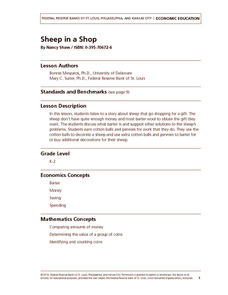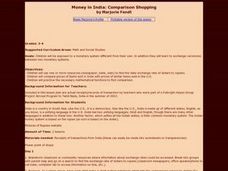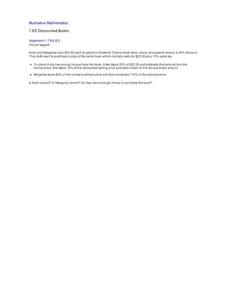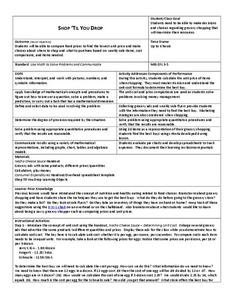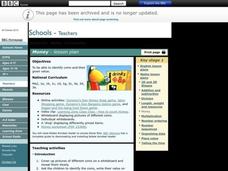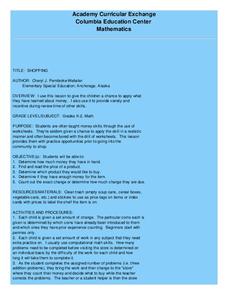Curated OER
Barter vs. Money
First graders listen to the book, Sheep in a Shop, that leads them to think about making financial decisions, trading, and the barter system. After the book is read aloud, a discussion ensues about some of the things that the sheep...
Federal Reserve Bank
Sheep in a Shop
What do you think sheep might be able to barter when they don't have quite enough to buy a gift? Your pupils can find out this and much more during this lesson plan about Sheep in a Shop, spending, saving, and bartering.
Curated OER
Menus & Money
Students explore, examine and study how to strengthen their skills in writing, drawing and handling money at the same time. They assess how to open a pretend diner, pet shop or grocery store. Each student names their pretend...
Curated OER
Common Sense Cookie Shop
First graders shop for a bag of cookies using toy money. In teams, they choose which variety to buy and decides which bills and coins are necessary to buy the bag of cookies and a cashier makes change. They tally the cookies purchased...
Curated OER
Currency and Exchange Rates
Fifth graders share the book, "The Story of Money" and discuss the uses of money, bartering, trade and the history of money. Students discuss various ways of spending: cash, check, debit/credit cards and review the check writing process....
SMART Project
Shop with Us at Whelan School
Third graders use their math and research skills to create and manage a classroom/school store. They use a computer to manage, organize and access information. They practice pricing products, computing sales, counting money and...
Curated OER
Valentine Shop
Students use Coin Critters software to practice coin recognition. Students complete a printing project for the cover of Valentine cards and use monthly calendars or a hundreds chart to count by 5's and 10's. Students use KidPix to create...
Curated OER
Money in India: Comparison Shopping
Students are exposed to a monetary system different from their own. They learn to exchange currencies between two monetary systems. Practice the necessary mathematical functions to find comparison. Compare prices of items sold in India...
Federal Reserve Bank
Financial Fables: Shopping Wisely with Olivia Owl
Cover two subjects with one lesson! First, dive into English language arts; read an eBook, answer comprehension questions, and complete a cause and effect chart about the financial fable, Shopping Wisely with Olivia Owl. Then, take...
Illustrative Mathematics
Discounted Books
Adolescents love to shop, especially when an item is discounted. Here, shoppers only have a set amount of money to spend. Will they be able to make a purchase with the discount and tax added in? Percent discounts can be calculated...
Federal Reserve Bank
Creating a Budget
Learning to create and maintain a budget is an important life skill. Guide individuals in the discovery of their spending habits and how to track them. They then use what they learned to create a budget and make decisions on where they...
Curated OER
Going Shopping
Students investigate the value of money. In this money instructional activity, students simulate going shopping in their classrooms for various objects. Students use play money to pay for the objects.
Alabama Learning Exchange
No More Money Trouble
Young consumers explore money identification and counting. In this cross-curricular money instructional activity, they participate in comprehension and writing activities prior to and after reading the book Money Trouble by Bill Cosby....
Curated OER
Money and Banking
Students investigate percents and interest. In this algebra lesson, students invest money in a bank account and calculate the interest rate they receive over time. They convert percents to decimals and solve problems using percents.
Curated OER
Shop 'Til You Drop
Learners evaluate food prices. In this real world math lesson plan, students compare the cost of various grocery items to determine which is the best deal. They work in groups using grocery ads to decide how to get the most product for...
Curated OER
Curiosity Shop
First graders simulate shopping for needs and wants. In this money lesson, 1st graders examine Norman Rockwell's painting "Curiosity Shop." Students role-play shopping in a store and making purchases.
Curated OER
Money
Learners complete online activities to identify coins and their given values. In this coin values lesson plan, students identify pictures of various coins and write their values. Learners may then complete other activities based on a...
Curated OER
Cool Cookie Math
Second graders identify the value of coins and make change from a dollar using different amounts. They are given story problems and use a fake shop in which they can buy things in which they have to determine how much change they would...
Curated OER
The Big Buck Adventure: Part 2
Young scholars go on a pretend shopping spree. In this money activity, students complete a Shopping Spree activity sheet where they pretend they have won $100 and can spend it on a fake shopping spree. Young scholars use the...
Curated OER
Shopping
Students demonstrate how to count money through a simulated shopping experience. In this consumer math lesson, students read the book Just Shopping With Mom and count play money to illustrate how much the items in the book cost.
Curated OER
Pop Shop 4 - Shopkeeping
Learners create a store where they sell pictures, tee shirts, and prints. In this store lesson plan, students learn about sales, marketing, and how to run a business.
Curated OER
Shopping
Learners determine how much money they have in hand, find and read the price of a product, determine which product to buy, determine if they have enough money, and count out exact change or determine how much change is due.
Curated OER
The Ice Cream Stands Problem
Tenth graders pretend to set up an ice cream shop in a make believe town of shapes. In this geometry lesson, 10th graders work together to put up an ice cream stand in an ideal location and solve for the minimum given the...
Curated OER
Shopping!!!
Students explore money management. In this financial awareness lesson, students are given an amount of money and a sheet of objects to choose from to buy. Students choose only five objects they can afford to "buy."



